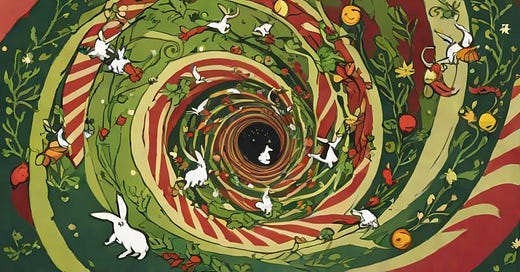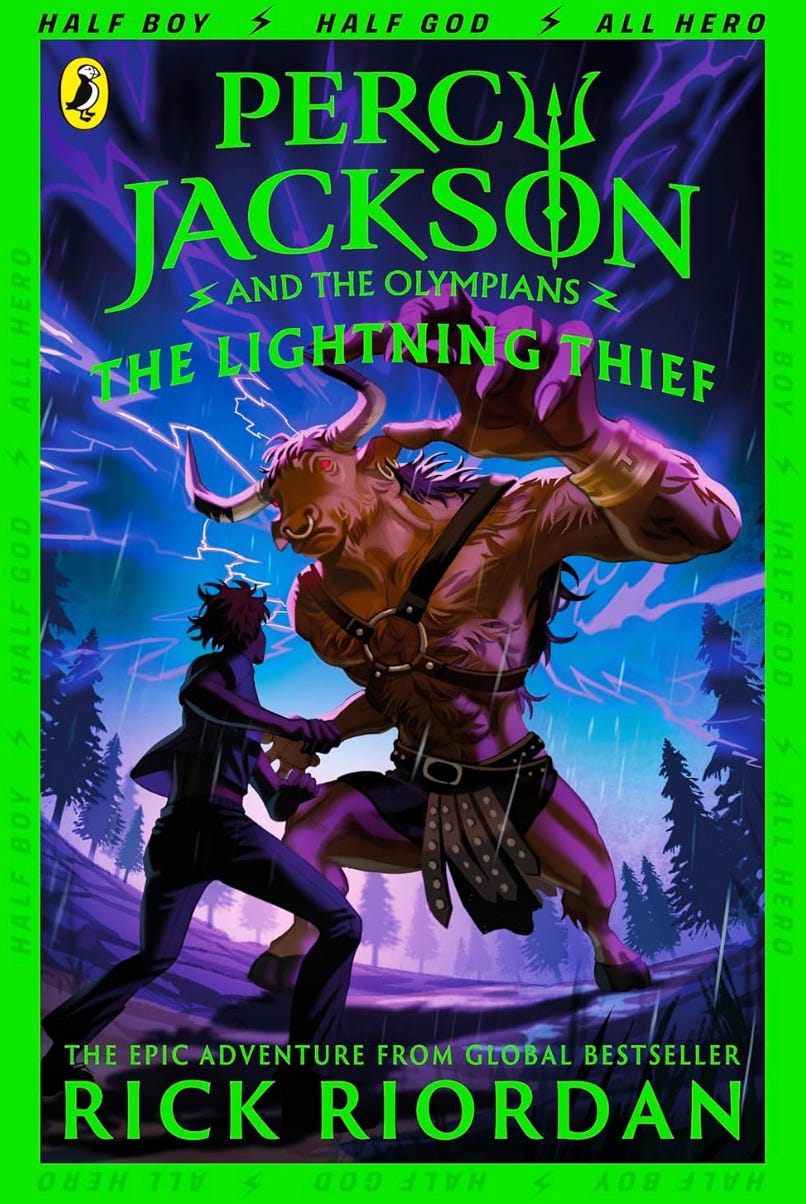Welcome aboard The Bus!
The Stop
At the centre of the Christmas story is the idea of virgin birth - the doctrine that Jesus Christ had no natural father, but was conceived through the power of the Holy Spirit. While parthenogenesis (asexual reproduction in which a female produces an embryo without a sperm-fertilised egg) is not uncommon amongst some creatures,1 it doesn’t happen in humans2 - and to explain a pregnancy as arising from such is, at best, difficult to accept in today’s scientific, rational world.3 However, the world in which Christianity emerged was very different to ours. It was a world full of gods and heroes - many of whom were the product of virgin births - and today’s Stop is the story of one that once was as important as the birth celebrated by Christmas rituals and songs.4
Acrisius, king of Argos, was disappointed that he didn’t have a male heir, but upon consulting the Oracle at Delphi, he was warned that one day he would be killed by his daughter's son. Fearing for his life, Acrisius locked his daughter Danaë in a bronze chamber to prevent her from meeting a suitor. Open only to the sky, the chamber was effectively a prison, but one day Zeus - in the guise of a shower of gold - miraculously impregnated her and nine months later Danaë gave birth to a baby boy she named Perseus.
Upon discovering the birth, Acrisius was furious and had both Danaë and Perseus sealed into a wooden chest and set adrift in the sea. Danaë prayed to the gods to be rescued, and the two eventually washed ashore on the island of Seriphos. There they were discovered by Dictys, a fisherman who happened to be the brother of Polydectes, the king of the island. A kind man, Dictys took them into his house and raised Perseus as his son.
Polydectes desired Danaë, but Perseus knew the king was wicked and continually protected his mother by intercepting his advances. Polydectes decided to disgrace Perseus, so he held a banquet in which each guest was expected to bring the gift of a horse. Perseus - who had no horse to give - asked Polydectes to name any gift he wanted, promising he would be unable to refuse whatever he asked. Knowing he was sending the boy to his death, Polydectes demanded that Perseus bring him the head of Medusa - the snake-haired Gorgon whose gaze turned anyone who looked into her eyes to stone.
The long and the short: Perseus obtains a sword from Zeus, winged sandals from Hermes, an invisibility helmet from Hades, and a polished shield from Athena. Using these gifts in various manners, he discovers the location of Medusa and, using the polished shield to avoid looking her in the eye, beheads the Gorgon and places her head in a special sack. On his way back to Greece, he rescues the Ethiopian princess Andromeda who had been chained to a rock as a sacrifice to a sea-monster. Ever the hero, he kills the creature and brings Andromeda back to Greece as his bride.
Returning to Seriphos, Perseus uses Medusa’s head to turn the wicked Polydectes to stone, and then travels with his mother back to her native country of Argos. While there, he ends up participating in some athletic games and accidentally kills his grandfather with a badly-thrown discus - fulfilling the prophecy that led to the circumstances which resulted in his birth in the first place.
The Detour
Today’s Detour is to An Island Off An Island, a short (8:09) video about Jenene and John who, for the last 20 years, have lived a simple life together in Bruny, an island off the island of Tasmania at the southern end of Australia. With a population of around 700, the challenges and opportunities of living there are unique, and the pace of the film certainly makes the lifestyle very appealing.
The Recommendation
Today’s Recommendation is to Percy Jackson & The Olympians, a series of six Young Adult novels (2005-2023) by Rick Riordan. I’ve only read the first two (at the suggestion of my niece not long after their release), but these retellings of the classic Greek myths in a 21st century setting are a great way of getting young people into these stories. The general gist is this: 12-year-old Perseus ‘Percy’ Jackson discovers he - and several of his friends - are the sons and daughters of various Greek gods who have abandoned their children as part of a pact to no longer engage themselves in the human world.5 Unfortunately, other less scrupulous beings don’t wish to remain uninvolved and the children have to work together to prevent the Titans - led by the evil Kronos - from destroying the world. It’s well-written, intelligent and entertaining - and a good suggestion if you’re looking for a Christmas gift for a middle grade reader.
From the back cover (of the first book, The Lightning Thief): Percy Jackson is about to be kicked out of boarding school … again. And that’s the least of his troubles. Lately, mythological monsters and the gods of Mount Olympus seem to be walking straight out of the pages of Percy’s Greek mythology textbook and into his life. And worse, he’s angered a few of them. Zeus’s master lightning bolt has been stolen, and Percy is the prime suspect.
Now Percy and his friends have just ten days to find and return Zeus’s stolen property and bring peace to a warring Mount Olympus. But to succeed in his quest, Percy will have to do more than catch the true thief: he must come to terms with the father who abandoned him; solve the riddle of the Oracle, which warns him of betrayal by a friend; and unravel a treachery more powerful than the gods themselves.
The Sounds
Today’s playlist is a selection of five tracks to use as a mellow anchor when the holiday rabbit hole starts to spiral in earnest: ‘Operator (That’s Not the Way It Feels’) (Jim Croce, 1972), ‘Fool to Cry’ (The Rolling Stones, 1976), ‘Landslide’ (Fleetwood Mac, 1975), ‘Helplessly Hoping’ (Crosby, Stills & Nash, 1969) and ‘Oh Very Young’ (Cat Stevens, 1974).6 Enjoy!
The Thought
Today’s Thought is from Aldous Huxley:7
‘The secret of genius is to carry the spirit of the child into old age, which means never losing your enthusiasm.’
If you have a thought on this Thought - or any part of today’s issue - please leave a comment below:
And that’s the end of this Stop - I hope you enjoyed the diversion!
Thanks to everyone who subscribes - your interest and support is truly appreciated. If you like The Bus, please SHARE it with a friend or two.
If you haven’t climbed aboard The Bus, please do!
If you like The Bus, why not check out other newsletters?
The Sample sends out articles from blogs and newsletters across the web that match your interests. If you like one, you can subscribe with one click.
Until the next Stop …
Parthenogenesis can occur naturally in some plants and algae, but also in certain species of scorpions, bees, fish, amphibians, reptiles and birds.
Actually, it can - but it only results in the production of tumours. Not people.
I am, of course, assuming Bus Riders are scientific and rational as there are certainly individuals out there who aren’t - and they scare me the most.
Sources for today’s Stop include Parthenogenesis (National Geographic), Parthenogenesis in Humans (NIH), Perseus (Britannica) and Perseus.
It seems it’s the gods’ fault that human wars happen, and after WWII (which, in this parallel world, was the result of a fight between their offspring) they decided to have no further children as they are too powerful and destructive.
It wasn’t until I started looking up the dates that I noticed these were all from the same era.
Huxley’s been the topic of a Stop (Issue 2.2; 6 October 2022) and has provided a few Thoughts. For more information, see: Aldous Huxley (Britannica).








What a lovely sequence of tracks in your playlist! This will get a few plays in our house as December progresses (how is it the 11th already?)
I want to gently suggest that 'Percy' and like retreads don't need the extra booming given that Disney(?) has picked it up. Symptomatic of the wider nostalgia industry, this Blytonesque redux festival needs to be put to rest. All these tales do for emerging youth is make the young more tolerable for adults; that is, more conveniently controlled given that antique allegories imagined in a completely different metaphysics should have any ethical relevance to their modern lot. Such epics are evidence of avoidance; of our world crisis, of the absence of an ipsissimous culture, of the lack of autochthonous art. They are the children's version of autobiographical journalism, or yet dramatized news reports, masquerading as 'novels' (Miriam Toews) or 'let's rewrite a Homeric tale or a Victorian news story but with a female lead' (Atwood) and thus have no creative merit. And speaking of retreads, I think 'The Bus' may have suffered a flat tire in this installment. Now whether it just ran over the rusty spike of an English tuck-shop sensibility or one of my fictional characters shot it out with her FNX .45 Tactical avec 'silenceur' is another matter entirely.